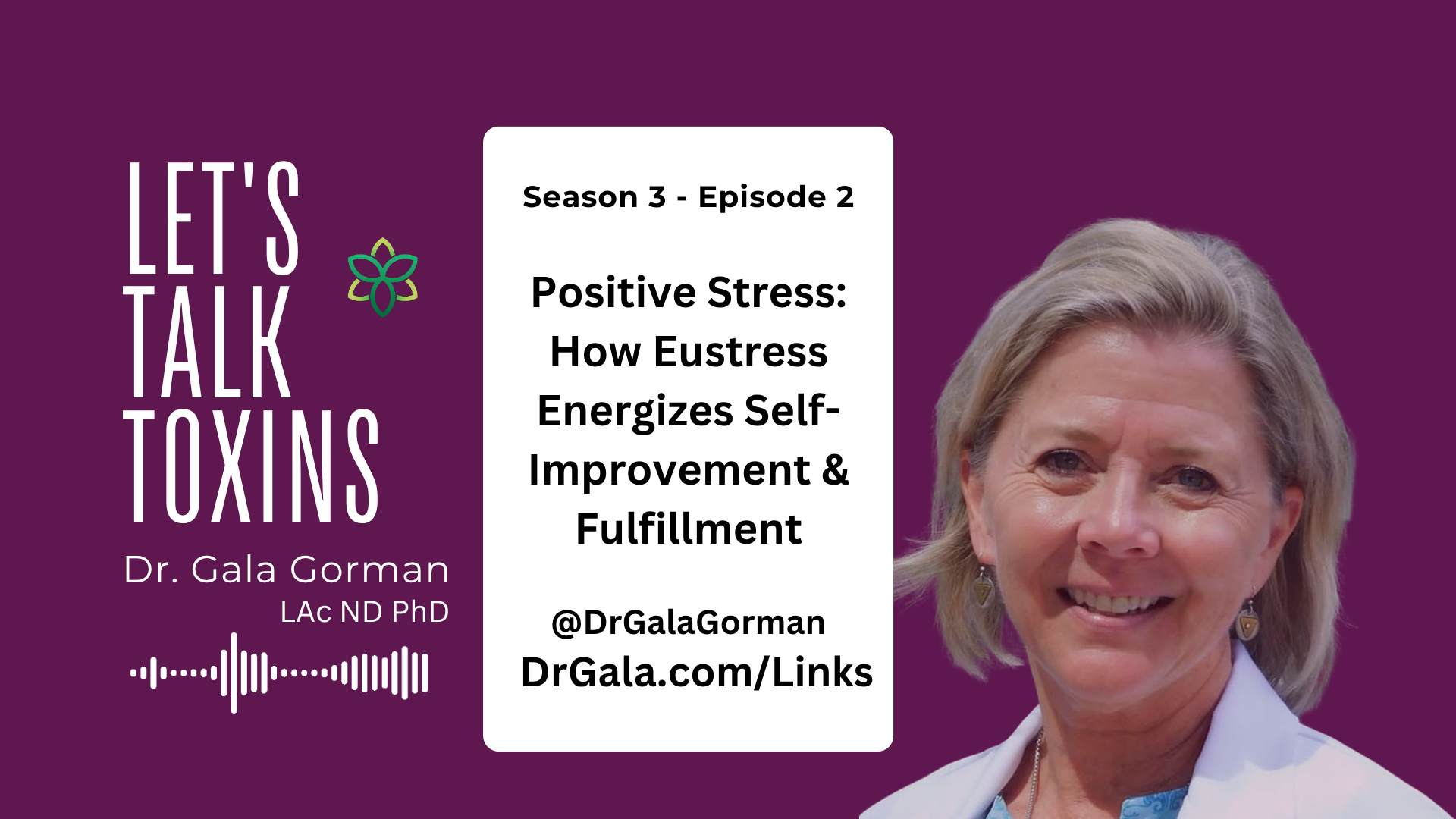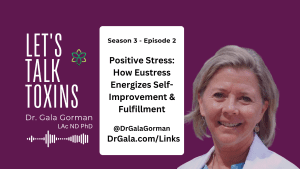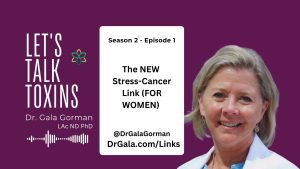NOTE: A machine generated this transcript. Please be aware that it may contain occasional errors in punctuation and spelling.
Short bursts of stress stimulate the production of new nerve cells in the area of the hippocampus. That’s what we just mentioned, and this is really the vital area for learning and memory. These animals, the rats were exposed to moderate brief stress, and they performed better on the memory tests, indicating that this positive stress really does enhance the cognitive abilities.
Welcome to the Let’s Talk Toxin Show. In this episode, we are exploring a surprising side of stress that’s actually good for you. Eustress, also known as positive stress. Imagine turning everyday pressures into powerful tools for personal growth, boosting your confidence, and finding new motivation to chase your goals. If you’ve ever wondered how to step outside your comfort zone. Use life’s challenges to your advantage, you are in the right place.
Let’s talk about how embracing eustress can transform stress from a burden into a secret weapon for resilience and lasting fulfillment. And make sure you stay tuned until the end. Where I’ll answer your questions about making stress work for you, and if you’re new here, I’m Dr. Gala Gorman, a licensed acupuncturist, naturopath, and author of “What’s Your Kryptonite?“ I wrote the book to help women understand the effects of chronic stress that’s turned toxic. In the book, I share the MOLT Method™ I developed to make it easy to shed stress along with the accumulated toxicity. Just like any other creature in nature that’s outgrown its trappings.
Many women find their way to me after trying everything to deal with their annoying symptoms. You may feel like you’ve learned more than you ever wanted to know about health, and still aren’t healthy. It’s time for a different approach. Symptoms are directly related to stress, but stress isn’t easy to master and it isn’t going away.
Many women find their way to me after trying everything to deal with their annoying symptoms. You may feel like you’ve learned more than you ever wanted to know about health and still aren’t healthy. It is time for a different approach. Symptoms are directly related to stress, but stress isn’t easy to master and it isn’t going away.
If you are ready for a new approach that will lead to stress mastery, I highly recommend my Wellness Warriors membership. It’s perfect for those who have a strong sense. They’re missing something important. That’s the key to optimal wellness. In the membership, we apply the MOLT method I developed. MOLT is an acronym: M for mindset, O for order, L for lifestyle, T for toxins. It’s designed to help you shed stress cruise through midlife symptom-free and end issues like chronic fatigue, insomnia, and weight gain. Join us and turn your knowledge into real change. You can learn more at DrGala.com/Links.
So in this next segment, I share information from research studies related to toxicity. You can think of it as a toxin trend. The T in MOLT stands for toxins. And, I can say with confidence that every symptom is caused by accumulated toxicity. I evaluate 12 categories of toxicity when I’m working with someone to unravel a health mystery.
Our world is full of manmade substances that our bodies were not designed to deal with. Coupled this toxicity with an overwhelming amount of toxic stressors the body was designed to manage. And it’s no wonder women find themselves playing whack-a-mole with symptoms. So this report we’re looking at today is just a great example of a toxin trend. So it’s talking about how short-term stress enhances learning and memory. So it was a significant piece of research on positive stress from a professor at UC, Berkeley. Her name is Daniella Coffer, and she found that acute short-term stress actually primes the brain for improved performance and learning.
In experiments with rats, brief stressful events led to the generation of new nerve cells in the hippocampus, and these new cells help the animals perform better on memory tests even two weeks later. This research suggests that moderate, manageable stress can enhance alertness, cognitive function, and personal growth. It really highlights the benefits of eustress when experienced in the right amounts.
Short bursts of stress stimulate the production of new nerve cells in the area of the hippocampus. That’s what we just mentioned, and this is really the vital area for learning and memory. These animals, the rats, were exposed to moderate brief stress, and they performed better on the memory tests, indicating that this positive stress really does enhance the cognitive abilities. The study highlights that not all stress is harmful. When experienced in moderation, stress can actually foster brain resilience and support personal growth.
So, if you’d like to learn more about the different types of stress that may be affecting you. You can get Chapter 12 of my book, “What’s Your Kryptonite?” for free. It’s dedicated to helping readers manage what I refer to as tricky toxins. Our bodies are bombarded with toxicity, so we have to learn to manage it. Just comment “tricky toxins”, and we’ll send you a link where you can download the chapter for free. If commenting isn’t convenient, go to DrGala.com/Links and sign up for my Wellness Weekly newsletter. You can respond to any email you receive from me with tricky toxins, and we’ll send you a link.
Now in this next segment, I am opening the kimono, so to speak, to share how I was challenged to apply my suggestions. I’m Walking My Talk, and here’s an example. Every suggestion you’ll hear from me has been tested in the “trenches.” That includes saying no to symptom suppression.
Over the past four decades, I’ve developed processes that work sustainably. Typically, it requires a combination of approaches that I’ve synthesized to address the health issues that show up repeatedly for many women.
So, I’m gonna share here an example from a period of time many years ago, but it applies today just as much as it did back then. So you may know, if you’ve been around here for a while, that I’m a retired CPA and tax season is unavoidably stressful. There was just absolutely no way to avoid it. I consider myself a pretty organized person. I am really into developing systems and so, you know, believe me when I say I tried everything to make tax season less stressful.
Basically, it just came down to going through the stress, to the point of distress. And then, really making sure that we set aside the time for recovery when we came out of it at the end of April typically.
So over the years, I learned that most businesses have what is referred to for us as a tax season. They have some sort of busy season or high season, and they have to learn to manage it in some cases. To some degree, the happy brain chemicals from this really heightened activity can help to offset the stress. But really as it extends beyond, you know, a few days to a few weeks, it really does escalate to distress. And, it’s no longer a eustress for all intents and purposes. So in this case, you wanna avoid all optional stressors when you are under really significant stress. It’s really important to make sure that you’re eating a super healthy diet.
What does that mean? For me, that would be avoiding the Fierce 5. The Fierce 5 is just a phrase I coined for five things that are in common diets that really don’t do our immune system any favors. That is wheat, grains or gluten, dairy, sugar, yeast, and alcohol. And unfortunately, when we’re under a lot of stress, we tend to crave things that are not that great for us. And then, it just adds additional stress to an already stressful situation.
You can offset a lot of this stress by just intentionally manufacturing happiness with aware appreciation. This is one of the 10 day sprints that we use in the Wellness Warriors membership. And you can reverse six weeks of damage with just a one-week sprint. So you really do not want to take these sprints lightly. If you haven’t checked out the Wellness Warriors membership, I encourage you to do that. If you really feel like you’ve got more of an issue, you’re probably gonna need one of my more extensive programs or some more in depth intervention.
If you’ve been really under chronic stress for six months or more, you can reverse about six months of damage in one month. My reset program is a six-week program designed to reverse this accumulation of toxicity. The toxic stress that really kind of accumulates, and our body gets to the point where it just can’t manage it any longer. Without having some kind lengthy break and support to rid itself of the accumulated toxicity.
Now let’s talk about a side of stress that doesn’t get nearly enough attention, eustress, or the positive side of stress. While most of us think of stress as something to avoid, eustress is actually the spark that can push us to grow, achieve, and thrive. Understanding how to recognize and harness this beneficial form of stress can make all the difference in turning life’s challenges into powerful opportunities for personal growth and fulfillment.
So let’s dive into what makes you stress so unique, how it differs from harmful stress, and how you can invite more of it into your life. So, first of all we need to compare eustress and distress. Eustress can expand coping resources and fosters resilience, while chronic distress can harm health. Activities like learning new skills or hobbies can promote eustress leading to a sense of improved well-being.
Strategies to increase eustress include making challenges manageable and increasing resources to meet them. Eustress fosters resilience and expands coping. To go a bit further, strategies to really promote eustress or enhance the eustress effect include resource building and adjustment of tasks so they feel more manageable. Eustress really is a positive form of stress that motivates, energizes, and enhances performance, especially in challenging but manageable situations.
It can promote personal growth, increase resilience, and help individuals feel more capable of handling life’s demands. I can use the tax season example here and say that every year we wondered if we would get it all done. And after enough years of getting through it, we got to the point where we just knew, yes, we’ve got a you know, hang in there and keep working towards the end goal.
But we knew we had confidence in ourselves that we would get there. So this really helped to keep the stress from really escalating to the point where we had a meltdown, before we got to the finish line. Understanding and harnessing eustress can lead to a more fulfilling and meaningful life by turning stress into an opportunity for improvement. Eustress motivates and energizes in challenging situations. It really promotes personal growth and resilience, and helps you to create a more fulfilling and meaningful life.
So we can think of this as personal growth stress. Eustress leads to psychological benefits like improved focus, a sense of autonomy, self-confidence, and a desire to improve. It really bubbles up from rewarding challenges like we’ve been talking about here. Maybe preparing for a big event or really other sorts of seasons essentially in your life, and can really be a motivator giving you sense of purpose.
Experiencing eustress helps build resilience and a positive mindset. Eustress improves focus and self-confidence, builds autonomy and motivation, encourages resilience, and a positive outlook. So really as you can see, eustress has a lot of benefits. You really wanna embrace it and make sure you’re ringing all the benefits out of it.
Remember, you can get the Tricky Toxins chapter of my book, “What’s Your Kryptonite?,” for free. Just comment “Tricky Toxins”, and we’ll send you a link where you can download the chapter. If commenting isn’t convenient, go to DrGala.com/Links and sign up for my Wellness Weekly newsletter. You can respond to any email you receive from me with tricky toxins, and we’ll send you a link.
Now, let’s continue with some practical ways to invite more eustress into your life. And turn everyday pressures into opportunities for growth. We’re going to explore simple strategies to help you recognize positive stress, embrace new challenges, and build resilience no matter what stage of life you’re in. And don’t forget, I’d love to hear which eustress boosting tips you’re excited to try. So be sure to share your thoughts in the comments.
So, stress really can affect your quality of life. Stress can have a profound effect on how you feel and function in your daily life. Its impact reaches across physical, psychological, and social domains, influencing overall health and well-being. Chronic stress negatively affects both physical and mental health. Increasing the risk for conditions like heart disease, depression, and anxiety, which can significantly lower quality of life.
Personal and social stressors are strongly associated with reduced quality of life with personal health stressors. Like health concerns and daily life challenges, having the greatest impact. Just think of the kid that’s been bullied in school and how that mental and emotional stress has affected them, potentially traumatizing them long-term. So, this is really important to consider how we’re gonna create a supportive environment around us, that challenges us in a good way. Happiness can really play what’s thought of as a mediating role.
So, higher stress is linked to lower happiness, which in turn leads to poor quality of life across physical, psychological, and even social domains. So, how does stress turn toxic? Stress can serve as a motivator and a tool for growth, when it’s experienced in manageable amounts. But when stress really starts to accumulate or when stress piles on top of toxicity that the body is already struggling to manage, then that’s when stress turns toxic.
If you recall me talking about tax season and how stressful that was. And how important it was to avoid any optional stressors during that period of time. When you’re really stressed, these are the periods of time when you need to take really good care of yourself. Make sure you’re eating healthy. Make sure you are prioritizing sleep. Make sure you’re getting movement. Make sure you’re getting sunshine. If you’re really short on time, which is common when we are under a lot of stress. You’re gonna wanna make sure that you’re using every moment and squeezing the most value out of it.
So, this is how stress turns toxic. Stress turns toxic when it accumulates, and multiple stressors typically come together. To create an experience that your body just no longer can manage. But that’s why we’re talking here about eustress, so that you can make sure you are using stress in a beneficial way. And you’re able to recognize when stress is moving from eustress to distress, and then ultimately to distress.
And stress is correlated with disease over 90% of disease, the research has shown, can be tied to stress. Stress really can serve as a motivator and a tool for growth when experienced in manageable amounts. But when stress becomes overwhelming or persistent, its effects can shift from positive to harmful. Honestly, pretty quickly, understanding this transition is essential for maintaining well-being. So stress turns toxic when it becomes chronic, overwhelming, or unmanageable. Leading to negative physical and mental health effects. Like anxiety, depression, weakened immunity, and increased risk of chronic diseases.
So, unlike eustress, which is challenging but rewarding, toxic stress or distress arises when individuals feel unable to cope or control the situation. This results in feelings of helplessness and persistent emotional strain. Toxic stress can disrupt brain function, impair memory, and learning. And increase vulnerability to unhealthy behaviors and long-term health problems, especially when there’s no opportunity for recovery or support. And so, stress is definitely something that you want to understand and learn to master. Managing it honestly is not enough because we know stress isn’t going away. We’ve got to learn to master it and use it for our benefit.
In this next segment, the answers I give to questions I receive quite often apply to and would be helpful for most women. I’ve accumulated a few related questions, and I’ll answer them in this segment. I call it, ask away if you’d like to ask a question. I created a form so that it’s sure to get answered and your question could be shared in a future episode helping many other women.
So comment, “question”, and we’ll get you a link to the form. If commenting isn’t convenient, go to DrGala.com/Links and sign up for my Wellness Weekly newsletter. You can respond to any email you receive from me with question and we’ll send you a link.
Can positive stress improve my health or happiness?
Well, positive stress, which is also known as eustress, can absolutely contribute to better health and greater happiness when it’s experienced in manageable amounts. Eustress helps you grow, adapt, and find more joy in everyday life.
So let me just give you a few ways. Positive stress can really make a positive difference. So it boosts motivation and energy, helping you feel more engaged and enthusiastic about your goals. It strengthens resilience and coping skills, making it easier to handle future challenges with confidence. It enhances mood and well-being by turning challenges into opportunities for personal growth and achievement. So eustress 100% can improve your overall health and well-being.
What are some examples of positive stress in everyday life?
Positive stress or eustress often comes from new experiences. And challenges that are exciting and help us grow. So think about learning a new hobby or even, you know, I’ve been spending a lot of time in Panama. And Panama is a Spanish-speaking country, and even though I have three years of Spanish in school, I can assure you I am not conversational.
I have a fairly decent vocabulary in Spanish, but that gets me into trouble sometimes because by using the right vocabulary. Spanish-speaking people think I could speak Spanish, and then I’m like whoa, whoa, whoa, whoa, whoa, Poquito.
So this can definitely be an experience of eustress, but we usually get a good chuckle out of it. And, I quickly pull out my phone with Google Translate. So these situations can feel a bit nerve-wracking at first, but they ultimately boost our motivation. Confidence and sense of achievement for sure.
Here are some common examples of positive stress in everyday life. Starting a new job or project, the excitement and challenge of a new role or responsibility. It can really motivate you to learn and adapt, leading to personal and professional growth, learning a new skill or hobby. Taking on something unfamiliar, like a new language, Spanish or sport, pushes you out of your comfort zone and brings a sense of accomplishment as you improve.
Major life events or transitions. Events like moving to a new home, planning a wedding, or traveling to a new place can be stressful, but are often filled with anticipation and satisfaction once they’re completed. I often talk about manufacturing happiness and happy brain chemicals, dopamine being one of those. And you can just plan a vacation, travel adventure, and the dopamine will rush. So don’t put off.
Just even starting the planning, even if you think there’s no way it could happen for you in the near future. It will do you and your brain and body good to just get that dopamine rushing naturally in a positive way.
How can I use stress to grow or learn new things?
Stress when managed well, can actually be a powerful tool for personal growth and learning. So remember we talked about the rats. If you haven’t watched the whole episode, go back and watch the episode where I shared the experiment with rats and how eustress or, you know, this controlled, manageable stress, essentially really was demonstrated to improve learning and cognitive ability by viewing stress as a signal for opportunity rather than just a threat.
You can turn challenging moments into valuable life lessons. So, here’s a few ways to use stress for growth and learning. First, you’ve got to embrace new challenges, use stressful situations as chances to try new things, develop skills, and build confidence by stepping outside your comfort zone, reflect, and adapt. After facing stress, take time to reflect on what you learned and how you handled it so you can improve your approach in the future, and then set really meaningful goals.
And these are goals for you, not what the world thinks your goals should be. So set meaningful goals for yourself and channel the energy from the stress, trying to achieve those goals into something that matters to you, and turning pressure into motivation for self-improvement. And remember, turning pressure into motivation for self-improvement.
So that’s our last question, that we have time for here in this episode. But remember, if you’d like me to answer your specific question make sure to comment “Question,” and we’ll send you a link to the submission form. You’ll wanna subscribe to the channel notifications to get regular updates. And, I host an additional opportunity to get your questions answered in a podcast I call Live Less Stressed Live.
So again, make sure you subscribe to the channel and activate the notification, so that you get a heads up from YouTube. And that’s a wrap for this episode. This has been the Let’s Talk Toxin Show. Again, don’t forget to subscribe on YouTube and activate the notifications.
You’ll get a reminder when I’m going live next. Until then, be well.













